8 Multi-Currency Wallets for Beginners
Explore beginner-friendly multi-currency wallets that simplify cryptocurrency management with features like security, ease of use, and broad asset support.

Diving into cryptocurrency can feel overwhelming, especially when managing multiple wallets for different coins. Multi-currency wallets simplify this process by letting you store, send, and receive various cryptocurrencies in one place. Here are eight beginner-friendly options, each offering features like broad crypto support, ease of use, and strong security:
- Exodus: User-friendly with support for 100+ coins, available on desktop and mobile.
- Zengo: Keyless wallet using biometric login, ideal for beginners.
- Trust Wallet: Supports 10M+ assets across 100+ blockchains, backed by Binance.
- MetaMask: Popular for Ethereum and DeFi, with browser and mobile apps.
- Guarda: Multi-platform wallet supporting 50+ coins and staking options.
- Crypto.com Onchain Wallet: Covers 1,000+ tokens across 36 blockchains.
- Coinbase Wallet: Integrates with Coinbase exchange, supports diverse tokens.
- Atomic Wallet: Decentralized with staking but has a history of a security breach.
Each wallet offers unique features like fiat integration, platform compatibility, and self-custody options. Start small, prioritize security, and choose the wallet that aligns with your needs.
Quick Comparison
| Wallet | Supported Cryptos | Platforms | Security | USD Purchase | Best For |
|---|---|---|---|---|---|
| Exodus | 100+ | Desktop, Mobile | Non-custodial | Yes | Beginners, simple interface |
| Zengo | Limited | Mobile | Keyless (MPC) | Yes | Easy setup, biometric login |
| Trust Wallet | 10M+ | Mobile, Browser Extension | Non-custodial | Yes | Wide asset support |
| MetaMask | Ethereum-focused | Browser, Mobile | Non-custodial | Yes | DeFi and Web3 users |
| Guarda | 50+ | Desktop, Mobile, Web | Non-custodial | Yes | Staking, multi-platform use |
| Crypto.com Wallet | 1,000+ | Mobile | Non-custodial | Yes | Advanced blockchain coverage |
| Coinbase Wallet | Broad range | Mobile, Browser Extension | Non-custodial | Yes | Integration with Coinbase |
| Atomic Wallet | Large selection | Desktop, Mobile | Non-custodial | Yes | Staking, but security concerns |
Start with wallets like Exodus or Zengo for simplicity or explore Trust Wallet and MetaMask for broader crypto options. Always prioritize security by safeguarding your recovery phrase and enabling features like 2FA.
What to Look for in a Multi-Currency Wallet
Picking your first multi-currency wallet doesn’t have to be complicated. By focusing on a few key features, you can ensure a safer and smoother crypto experience. Here’s what to consider when making your choice:
Supported Cryptocurrencies
Make sure the wallet supports a wide range of cryptocurrencies. While Bitcoin and Ethereum are standard, it’s helpful to have support for popular altcoins like Litecoin, Bitcoin Cash, and ERC-20 tokens. The best wallets often handle 100+ cryptocurrencies, giving you the flexibility to expand your portfolio without switching platforms later on.
User Interface
A wallet’s design can significantly impact your experience. Look for a clean, intuitive layout that’s easy to navigate. Features like clear transaction histories, balance displays in USD, and straightforward send/receive functions are especially useful for beginners.
Security Features
Security should be a top priority. Choose a wallet that lets you control your private keys and offers features like a seed phrase backup (usually 12-24 words), two-factor authentication, and biometric locks. If you’re planning to hold larger amounts, hardware wallet integration provides an extra layer of protection.
Platform Availability
Convenience matters. The best wallets are accessible across iOS, Android, Windows, Mac, and web browsers, allowing you to manage your crypto from anywhere. Since many users prefer handling their wallets on mobile devices, a mobile-friendly design is especially important.
Fiat Integration
Simplify your crypto transactions with built-in fiat options. Wallets that let you purchase cryptocurrencies directly in USD using debit cards, bank transfers, or other familiar payment methods save time and reduce hassle. This feature is particularly useful when you need to act quickly during market fluctuations.
Regulatory Compliance
For U.S. users, choosing a wallet that complies with local regulations is crucial. Wallets that follow KYC (Know Your Customer) guidelines and operate under proper licensing offer enhanced security and legitimacy. While this might mean a slightly longer setup process, it ensures you’re working with a trustworthy provider.
Customer Support
Good customer support can make a big difference. Look for wallets that offer 24/7 support, multiple contact options (like chat, email, and phone), and detailed help guides. Checking user reviews about response times can help you avoid frustrations later.
Transaction Fees
Fees can add up, especially for frequent traders. Wallets may charge flat fees, percentages, or simply pass along network fees. Understanding these costs upfront helps you manage your budget and avoid unexpected charges.
If you’re a beginner, also look for educational resources built into the wallet. Tutorials, market insights, and simplified crypto guides can help you learn faster and make smarter decisions.
1. Exodus
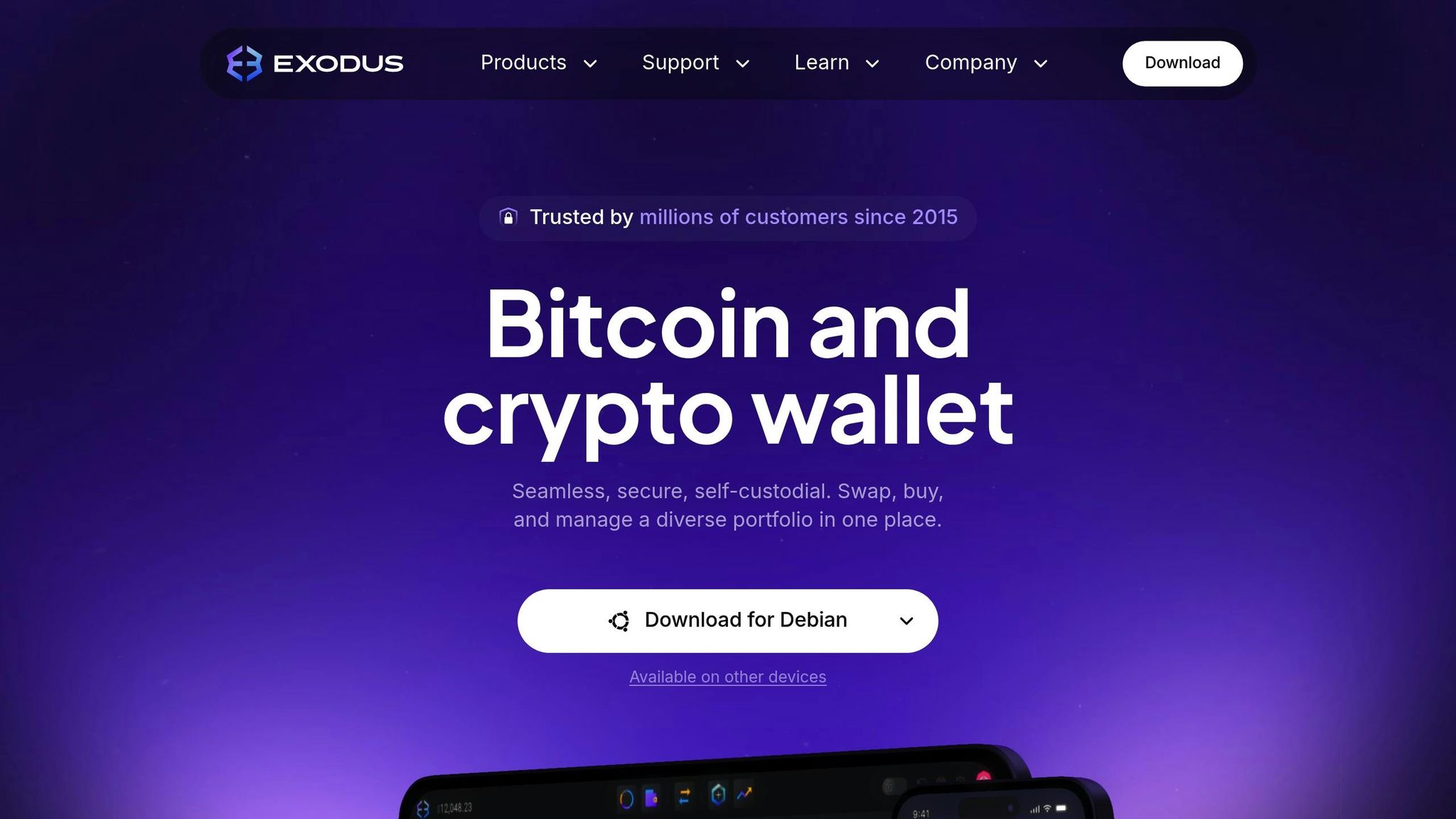
Exodus is a user-friendly wallet designed to help beginners manage multiple digital currencies with ease. Its clean and intuitive interface makes navigating the world of cryptocurrencies less daunting.
Supported Cryptocurrencies and Blockchains
With Exodus, users can access a wide range of cryptocurrencies across various blockchains. This flexibility allows newcomers to explore and gradually build a diverse portfolio, all within one platform.
Security Features
As a self-custody wallet, Exodus ensures users maintain full control of their private keys. Additionally, it offers backup options, giving peace of mind by enabling asset recovery in case of device loss or damage.
Platform Compatibility
Exodus works seamlessly on both desktop and mobile devices, providing flexibility for users to manage their portfolios wherever they are. This cross-platform functionality makes it a convenient choice for those just starting their journey into managing multiple cryptocurrencies.
2. Zengo
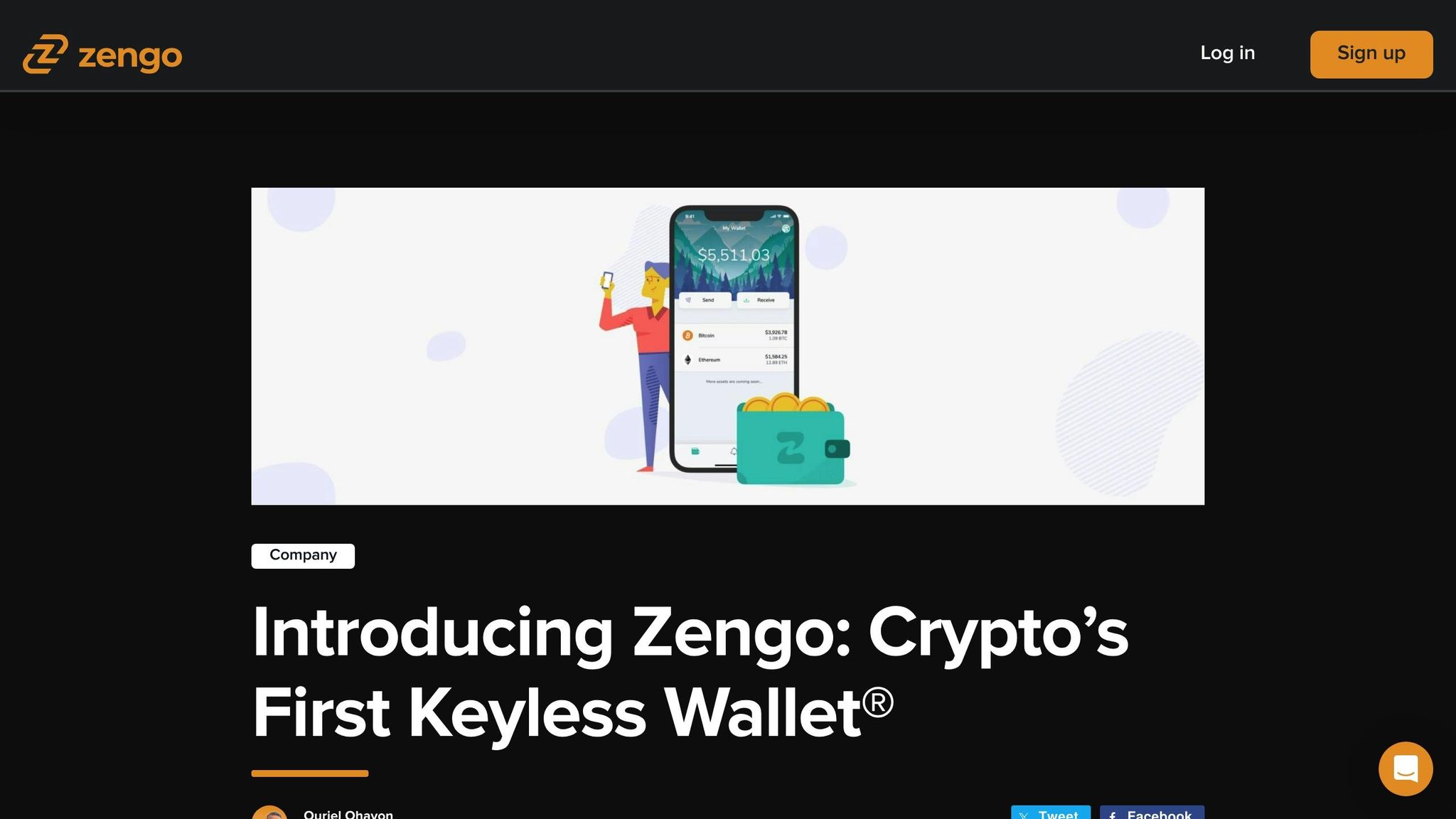
Zengo has carved out a niche as a keyless cryptocurrency wallet, eliminating the hassle of managing seed phrases. By mid-2025, it had attracted over 1.5 million active users worldwide, earning a strong reputation for combining ease of use with robust security measures.
Instead of relying on traditional seed phrases, Zengo uses a biometric login system. Simply put, users can access their wallets by scanning their face. This feature is especially helpful for beginners, removing the fear of losing access to funds due to misplaced seed phrases.
"Zengo is by far the easiest crypto wallet to use. Their UI/UX is unparalleled in the crypto space. It takes a minute to create an account. You won't be disappointed." - AlxDione
Security Features
Zengo employs Multi-Party Computation (MPC) technology to safeguard assets. This system splits cryptographic keys across multiple locations, ensuring that even if your device is compromised, your wallet stays secure. Impressively, since its launch in 2018, Zengo has maintained an impeccable record - it has never been hacked.
Platform Compatibility
Zengo is available on both iOS and Android, along with a desktop client. Its clean design and user-friendly navigation have earned it a solid 4.78-star rating, reflecting its appeal to both beginners and experienced users.
Integrated Buying Features
For users in the United States, Zengo offers a built-in feature to purchase cryptocurrencies directly within the app using U.S. dollars. However, the minimum purchase amount is $100, which might be a hurdle for those looking to start with smaller investments.
Zengo provides a free basic version tailored for beginners. For users seeking more advanced options and reduced fees, there’s the Zengo Pro subscription, priced at $19.99 per month or $199.99 annually.
Next, we’ll dive into Trust Wallet, another beginner-friendly option packed with useful features.
3. Trust Wallet
Trust Wallet is a versatile multi-currency wallet that supports over 10 million crypto assets across more than 100 blockchains. It accommodates a wide range of cryptocurrencies, including Bitcoin (BTC), altcoins like Litecoin (LTC) and Ripple (XRP), stablecoins such as Tether (USDT), utility tokens like Basic Attention Token (BAT), DeFi tokens including Uniswap (UNI), memecoins like Dogecoin (DOGE), and governance tokens such as Maker (MKR). This makes it an ideal choice for beginners who want to manage multiple cryptocurrencies without juggling multiple apps.
Supported Cryptocurrencies and Blockchains
Trust Wallet’s compatibility with a vast array of blockchain ecosystems gives users the freedom to access and manage a diverse portfolio of cryptocurrencies - all within a single app.
Integrated Buying Features
The wallet also simplifies the process of purchasing crypto by supporting over 110 fiat currencies, including the U.S. dollar. This built-in feature makes it easier for newcomers to get started in the crypto world without needing additional tools or platforms.
Up next, let’s dive into MetaMask, a wallet well-known for its role in decentralized finance and Web3 applications.
4. MetaMask
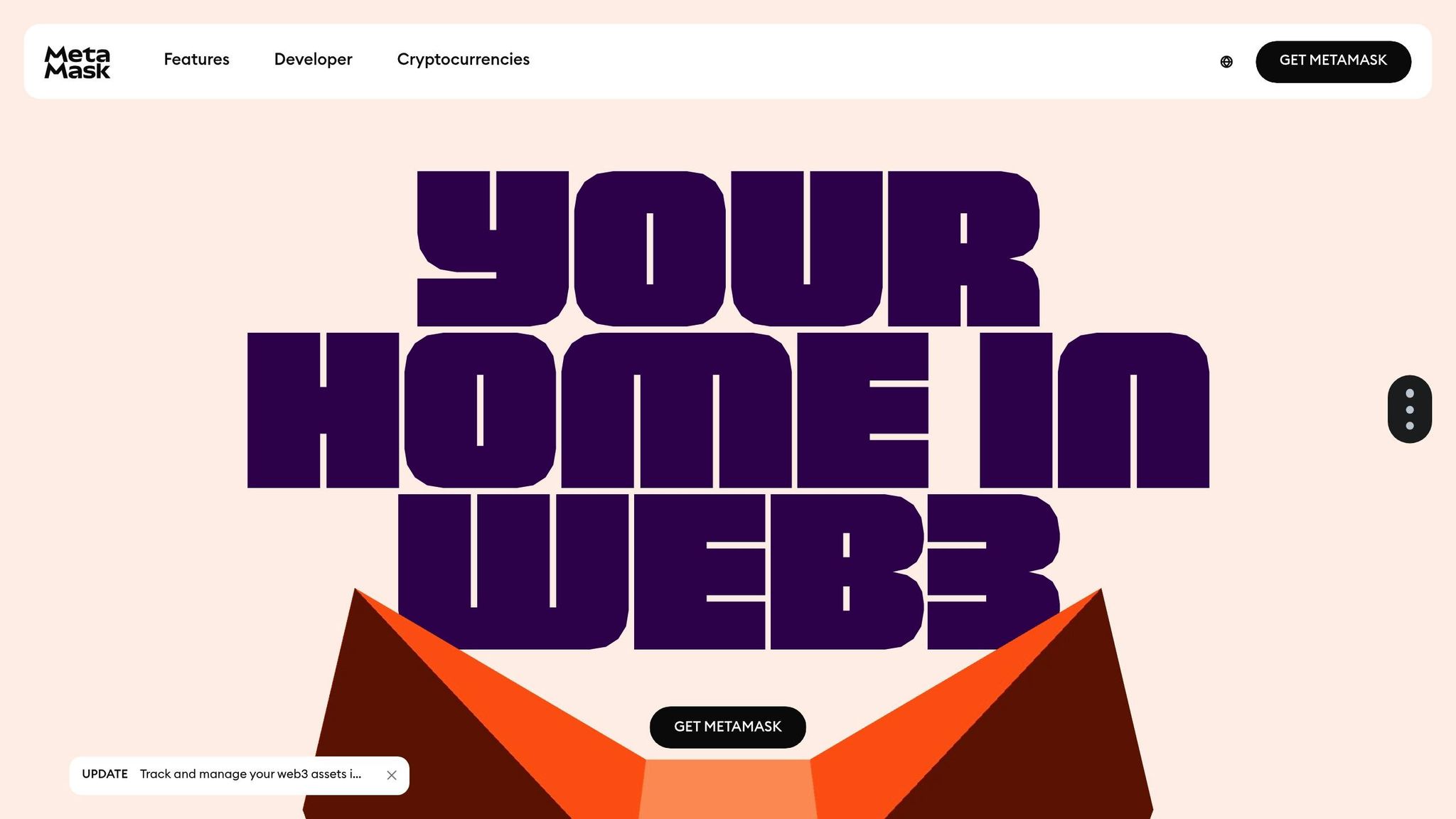
MetaMask has earned its place as one of the most widely used multi-currency wallets, especially for those diving into decentralized finance (DeFi) and Web3 applications. As both a browser extension and a mobile app, it’s a go-to choice for beginners exploring decentralized apps while maintaining full control over their crypto assets. Its compatibility across devices makes it easy to engage with decentralized platforms wherever you are.
Platform Compatibility (Mobile, Desktop, Browser)
MetaMask works seamlessly across various platforms. You can install it as a browser extension on Chrome, Firefox, Edge, and Brave, enabling smooth integration with Web3 websites and decentralized apps. For those on the move, MetaMask also offers dedicated mobile apps for iOS and Android, ensuring you can manage your crypto assets anytime, anywhere.
Supported Cryptocurrencies and Blockchains
MetaMask supports a range of networks, including Ethereum, ERC-20 tokens, Binance Smart Chain, Polygon, and Avalanche. This broad compatibility allows users to access multiple blockchain ecosystems without needing to juggle between different wallet apps, making it a versatile choice for exploring diverse digital assets.
Security Features (Self-Custody, Encryption, Recovery Options)
Security is a core focus for MetaMask, which operates on a self-custody model. This means you have complete control over your funds through a master key called the Secret Recovery Phrase (SRP). MetaMask never stores or accesses your private keys. Instead, your SRP is encrypted locally with your password, ensuring your wallet remains secure as long as you keep these credentials private.
Your 12-word SRP is the key to recovering your wallet. Keep it stored offline in a secure location - losing it means you won’t be able to recover your wallet. Avoid saving it in cloud storage or password managers, as these can be hacked. Also, be cautious: sharing your SRP or private keys gives others full access to your funds. Remember, MetaMask support will never ask for this information.
Integrated Buying Features for U.S. Dollars
For those new to crypto, MetaMask makes purchasing digital currencies straightforward. By integrating with various payment providers, it allows users to buy cryptocurrencies directly within the wallet using U.S. dollars. This feature eliminates the need to rely on external exchanges, streamlining the onboarding process for beginners.
Next, we’ll take a look at Guarda, a wallet that combines cloud-based convenience with traditional security measures, offering yet another way to manage your crypto assets.
5. Guarda
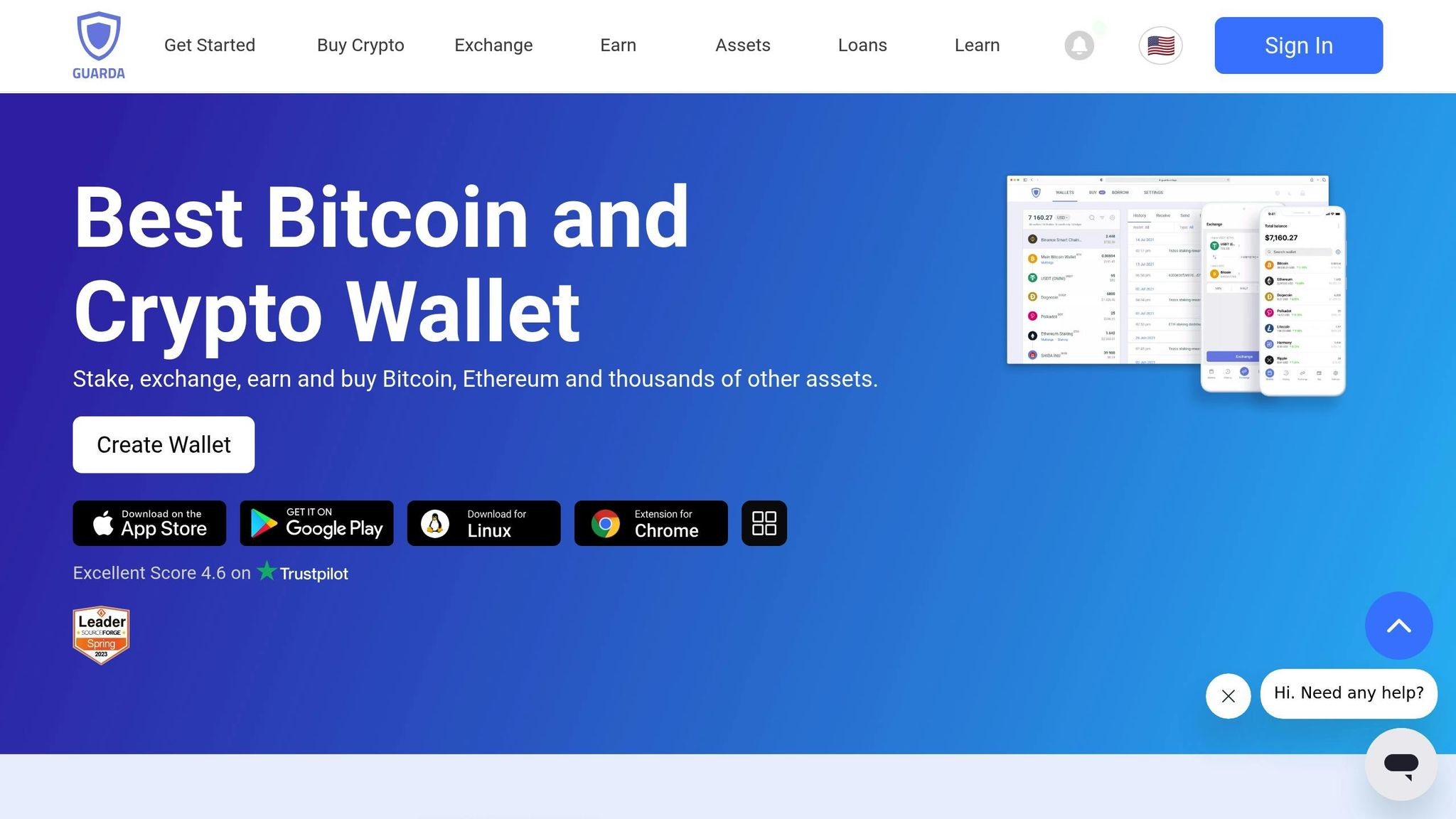
Guarda is a multi-currency wallet that combines ease of use with solid security, making it a great choice for those new to cryptocurrency. Its intuitive design lets users manage a wide range of digital assets while retaining full control over their private keys.
Platform Compatibility (Mobile, Desktop, Browser)
Guarda is accessible across multiple platforms, ensuring flexibility for users. It’s available as a browser-based app, desktop application (compatible with Windows, macOS, and Linux), and mobile apps for both iOS and Android. This cross-platform support means you can manage your crypto portfolio on your desktop at home and easily switch to your smartphone when you’re on the go.
Supported Cryptocurrencies and Blockchains
With support for over 50 major cryptocurrencies - like Bitcoin, Ethereum, Litecoin, and Bitcoin Cash - and thousands of ERC-20 tokens, Guarda makes it easy to explore a wide variety of digital assets without needing multiple wallets.
The wallet also connects with several blockchain networks, including Ethereum, Binance Smart Chain, and Polygon. This multi-chain compatibility not only broadens your options but can also help you take advantage of lower transaction fees on certain networks.
Security Features (Non-Custodial Control, Encryption, Recovery Options)
Guarda operates as a non-custodial wallet, meaning you have complete control over your private keys. When setting up your wallet, you’ll receive a 12-word recovery phrase that acts as a master key for accessing your funds. These private keys and recovery phrases are stored locally on your device and encrypted using AES-256 encryption, keeping your data secure. Additionally, a password adds another layer of protection, ensuring only you can access your wallet.
Integrated Buying Features for U.S. Dollars
Guarda makes purchasing cryptocurrency straightforward by offering built-in fiat-to-crypto options. U.S. users can buy digital assets directly within the wallet using credit cards, debit cards, or bank transfers. Exchange rates are displayed upfront, so you’ll know exactly how much crypto you’re getting before completing the transaction. While card purchases are typically processed within minutes, bank transfers may take one to three business days.
Up next, take a look at Crypto.com Onchain Wallet, another strong option for secure self-custody.
6. Crypto.com Onchain Wallet
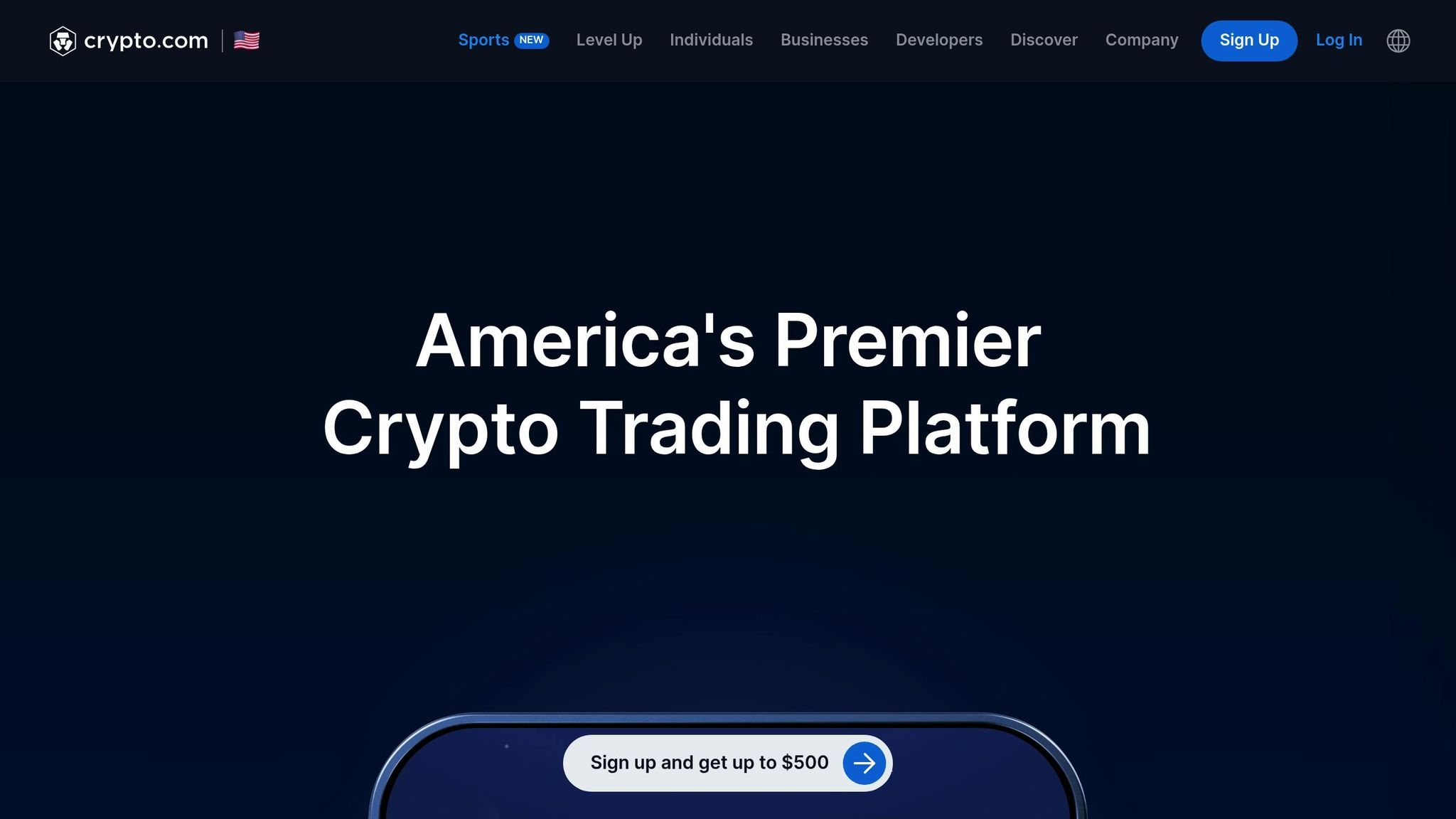
The Crypto.com Onchain Wallet is a self-custody wallet designed to give users full control over their digital assets. It’s ideal for beginners eager to explore multiple blockchain networks, offering extensive blockchain coverage and easy access across various platforms.
Platform Compatibility (Mobile, Desktop, Browser)
This wallet is built for flexibility, with full cross-platform support. You can use it on iOS and Android devices, including phones, tablets, and Chromebooks. For desktop users, there’s a dedicated DeFi Desktop Wallet application, and for quick web access, a Google Chrome browser extension is available. The mobile app has earned high ratings on both the Apple App Store and Google Play Store, making it easy to manage your crypto assets seamlessly across devices.
Supported Cryptocurrencies and Blockchains
Crypto.com Onchain Wallet supports over 1,000 tokens and coins across 36 different blockchains, making it one of the most comprehensive options available. Supported networks include popular blockchains like Cronos, Ethereum, Bitcoin, Polygon, Avalanche-C, Arbitrum, and Solana. It also supports newer networks such as zkSync Era, Base, and Polygon zkEVM. Some of the key cryptocurrencies compatible with the wallet include Bitcoin (BTC), Ethereum (ETH), Solana (SOL), Cronos (CRO), Litecoin (LTC), Dogecoin (DOGE), Bitcoin Cash (BCH), XRP, Stellar (XLM), Cosmos (ATOM), Polkadot (DOT), NEAR, BNB, and Polygon (MATIC). Keep in mind that activating new XRP and XLM wallets requires an initial 1-unit transaction, as per their ledger requirements.
Security Features (Self-Custody, Encryption, Recovery Options)
As a non-custodial wallet, Crypto.com Onchain Wallet ensures you maintain full ownership of your private keys and recovery phrases. Upon setup, you’ll receive a recovery phrase that acts as your master backup. This phrase is stored locally on your device and never shared with Crypto.com’s servers. Additionally, the wallet uses top-tier encryption to safeguard your data, and you can enhance security with PIN codes or biometric authentication on mobile devices. These features allow you to manage your funds securely without relying on third-party custody.
Next, we’ll dive into Coinbase Wallet as another user-friendly multi-currency solution.
sbb-itb-0796ce6
7. Coinbase Wallet

Coinbase Wallet is a self-custody wallet that gives you complete control over your private keys while providing easy access to a wide range of cryptocurrencies. Unlike the main Coinbase exchange app, this wallet emphasizes user autonomy and flexibility.
Platform Compatibility (Mobile, Desktop, Browser)
Coinbase Wallet is designed to work across various platforms, ensuring a smooth experience no matter how you choose to manage your crypto. It offers:
- A mobile app for both iOS and Android.
- A browser extension compatible with Chrome and Brave, with plans to include Safari and Firefox.
- A unified web app available at wallet.coinbase.com for both desktop and mobile browsers.
This adaptability allows you to connect and manage multiple wallets effortlessly. Coinbase also provides the Coinbase Wallet SDK, which acts as a bridge between your mobile wallet and desktop dApps. By simply scanning a QR code, you can securely interact with decentralized applications on browsers like Chrome, Firefox, Edge, Brave, and Opera.
As Coinbase puts it:
"Coinbase Wallet extension is the safest and easiest way to use crypto apps in your browser."
The web app at wallet.coinbase.com is the newest addition, offering a streamlined interface to view and manage multiple wallets, including popular options like MetaMask, Phantom, and WalletConnect-compatible wallets. This setup gives you a clear overview of your crypto holdings all in one place.
Supported Cryptocurrencies and Blockchains
Coinbase Wallet supports a broad range of cryptocurrencies and tokens across numerous blockchain networks. From Bitcoin and Ethereum to thousands of ERC-20 tokens, it’s built to accommodate diverse crypto ecosystems and enthusiasts exploring different blockchain projects.
Security Features
As a non-custodial wallet, Coinbase Wallet ensures you maintain full control over your private keys. Your recovery phrase is stored locally, providing an added layer of security. The Coinbase Wallet SDK further enhances safety by keeping your funds secure on your mobile device while interacting with desktop dApps. This combination of security and flexibility makes it a reliable choice for managing various cryptocurrencies.
Integrated Buying/Selling Features for U.S. Dollars
Coinbase Wallet integrates seamlessly with the broader Coinbase ecosystem, allowing you to buy and sell cryptocurrencies using U.S. dollars directly within the wallet. This feature eliminates the hassle of transferring funds between platforms, making it especially convenient for beginners looking to get started with crypto trading.
Next up, we’ll explore Atomic Wallet, another robust option for managing multiple cryptocurrencies.
8. Atomic Wallet
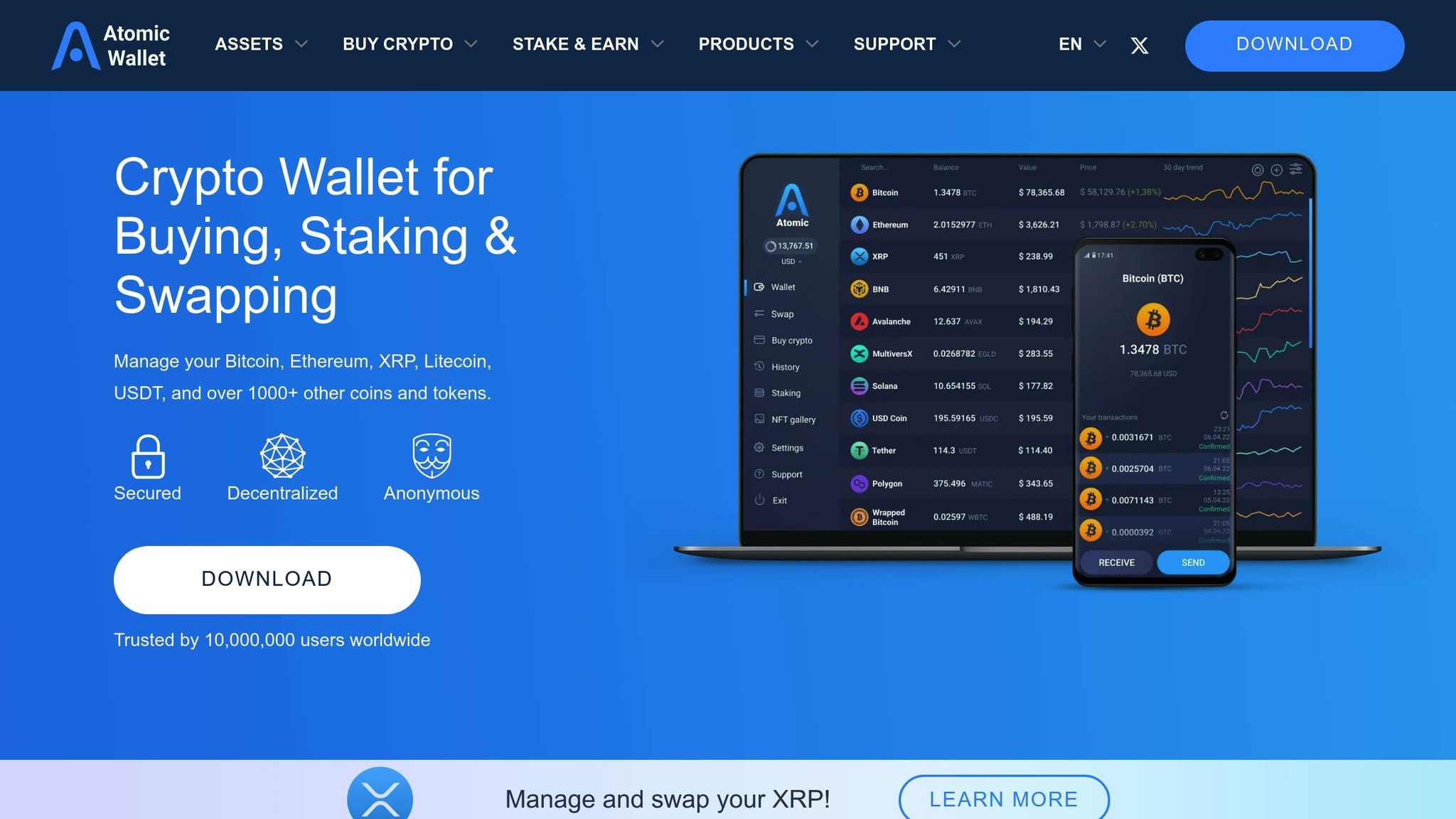
Atomic Wallet is a decentralized, non-custodial wallet designed for those new to managing multiple cryptocurrencies. It offers users complete control over their private keys and funds.
Security Features (Self-Custody, Encryption, Recovery Options)
As a non-custodial wallet, Atomic Wallet generates your private keys and 12-word seed phrase directly on your device, encrypting them locally. This means your sensitive information never leaves your device. To enhance security, every operation requires password confirmation, and the wallet includes safeguards against threats like viruses, keyloggers, malware, ransomware, DNS hijacking, and Man-in-the-Middle attacks. You can use its basic features without creating an account or undergoing verification, ensuring your anonymity remains intact.
To protect your funds, it’s crucial to secure your device and store your 12-word seed phrase offline - preferably in a fireproof safe. Never share this seed phrase, not even with Atomic Wallet’s support team.
However, it’s worth noting that in June 2023, Atomic Wallet experienced a significant security breach. Over $100 million was stolen from approximately 5,500 accounts, allegedly by the North Korean Lazarus Group. This incident highlights the risks of relying solely on software wallets for holding large amounts of cryptocurrency. Check out the comparison table below to see how Atomic Wallet measures up against other multi-currency wallets.
Wallet Comparison Table
The table below highlights the essential features of popular multi-currency wallets, making it easier to compare their offerings at a glance. It focuses on key aspects like supported cryptocurrencies, platform compatibility, security measures, ease of use, USD purchase options, and standout features. This summary condenses earlier discussions into a quick-reference format.
| Wallet | Supported Cryptocurrencies | Platform Compatibility | Security Type | Ease of Use | USD Purchase Support | Key Strengths |
|---|---|---|---|---|---|---|
| Exodus | Over 100 coins and tokens | Desktop, Mobile, Web | Non-custodial with encrypted keys | Very beginner-friendly | Yes, built-in exchange | Clean interface and responsive support |
| Zengo | Select cryptocurrencies | Mobile only (iOS, Android) | Keyless security (MPC technology) | Extremely easy | Yes, via third-party providers | Simplified security model with biometric options |
| Trust Wallet | Extensive token support across blockchains | Mobile, Browser extension | Non-custodial | Beginner-friendly | Yes, via integrated decentralized exchange | Backed by Binance with a wide asset selection |
| MetaMask | Ethereum and EVM-compatible tokens | Browser extension, Mobile | Non-custodial | Moderate learning curve | Yes, via integrated services | Strong DeFi integration; popular among Ethereum users |
| Guarda | A broad range of coins and tokens | Desktop, Mobile, Web | Non-custodial | Easy to moderate | Yes, built-in exchange | Multi-platform sync and staking options |
| Crypto.com Onchain Wallet | Numerous cryptocurrencies | Mobile only | Non-custodial | Easy | Yes, with direct exchange integration | Seamless integration with the Crypto.com ecosystem and rewards program |
| Coinbase Wallet | A wide variety of coins and tokens | Mobile, Browser extension | Non-custodial | Easy | Yes, via Coinbase integration | Trusted brand with easy connectivity to Coinbase exchange |
| Atomic Wallet | A large selection of coins and tokens | Desktop, Mobile | Non-custodial | Moderate | Yes, built-in exchange | Atomic swaps and staking rewards |
When choosing a wallet, remember the key factors: security, ease of use, and supported cryptocurrencies. Each wallet caters to different needs:
- User-Friendliness: Exodus and Zengo are particularly beginner-friendly, though Zengo's mobile-only design may not suit everyone.
- Security Features: While most wallets rely on seed phrases, Zengo stands out with its keyless Multi-Party Computation (MPC) technology, offering an extra layer of convenience and reassurance.
- Platform Options: Desktop users might lean toward MetaMask, Guarda, Exodus, or Atomic Wallet, while mobile-first users could find Trust Wallet, Zengo, or Crypto.com Onchain Wallet more appealing.
- Fiat-to-Crypto Purchases: All wallets support direct USD purchases, with Coinbase Wallet and Crypto.com Onchain Wallet excelling in seamless integration with their respective ecosystems.
For beginners seeking simplicity, Exodus and Zengo are excellent choices. If access to a wide range of digital assets is a priority, consider Trust Wallet or Coinbase Wallet. Meanwhile, those diving into decentralized finance (DeFi) will find MetaMask to be a powerful option, though it may take some time to master. Ultimately, the best wallet depends on your specific needs and preferences.
Safe Storage Tips for Multi-Currency Wallets
When using non-custodial wallets for your cryptocurrency, it's important to remember that you are your own bank. There’s no customer service to call if you lose access to your funds, so managing your wallet responsibly is critical. Here are some essential tips to help you keep your assets safe.
Stick to Official Sources
Always download wallet apps or software directly from official sources. Visit the wallet’s official website instead of clicking on links from emails or social media. For mobile apps, stick to the Apple App Store or Google Play Store. Scammers often create fake apps with names that closely resemble legitimate ones. Double-check the developer’s name and read recent reviews to ensure you’re downloading the right app.
Protect Your Recovery Phrase
Think of your recovery phrase as the master key to your wallet. Write down your 12 or 24-word recovery phrase on paper - never store it digitally in photos, notes, or cloud storage. Hackers can access these locations. Consider making multiple copies and storing them in secure places, such as a home safe or a bank safety deposit box.
Use Built-In Security Features
Take full advantage of the security options your wallet offers. Set up PIN codes, enable biometric authentication, and use two-factor authentication (2FA) whenever possible. These features add an extra layer of protection, especially if someone gets hold of your device. Make sure to create a strong, unique password that you don’t use for any other accounts.
Beware of Phishing Scams
Phishing scams are a common threat to cryptocurrency users. Scammers create fake websites that look almost identical to legitimate ones but use slightly altered URLs, like "exoduss.io" instead of "exodus.io." Always verify the URL before entering any sensitive information. Bookmark the official site of your wallet and navigate there directly to avoid falling for these tricks.
Test with Small Transactions
When using a new wallet, start with small transactions. Transfer $10 or $20 worth of cryptocurrency first to familiarize yourself with the wallet interface and ensure everything works as expected. This also lets you verify that your backup and recovery process is solid before moving larger amounts.
Keep Your Wallet Updated
Wallet developers frequently release updates to fix vulnerabilities and improve security. Enable automatic updates if possible, or check for updates regularly - monthly is a good rule of thumb. Additionally, test your recovery process by reinstalling the app and restoring your wallet from your recovery phrase. This way, you’ll be prepared to recover your funds if an emergency arises.
Separate Hot and Cold Storage
Hot wallets, which are connected to the internet, are convenient for daily transactions but are more vulnerable to online attacks. For long-term holdings, consider moving your cryptocurrency to a hardware wallet (cold storage), which stays offline except when you’re making transactions. This adds an extra layer of security for assets you plan to hold for months or years.
Never Share Your Private Keys
Under no circumstances should you share your private keys or recovery phrase. Legitimate wallet companies will never ask for this information via email, phone, or social media. If someone claims they need your recovery phrase to "fix a problem" or "verify your account", they’re trying to steal your funds.
Secure Physical Storage
Think carefully about where you store your recovery phrase. Fireproof safes can protect against natural disasters, while bank safety deposit boxes provide professional-grade security. Some users go a step further by engraving their recovery phrases on metal plates designed for cryptocurrency storage. These plates are more resistant to fire and water damage than paper.
Strengthen Your Digital Security
Use strong, unique passwords for all your cryptocurrency accounts, keep your computer’s operating system up to date, and install reputable antivirus software. A compromised computer can expose your wallet, even if you’ve followed all other precautions. These extra steps help safeguard your wallet and complement its built-in security features.
Getting Started with Your First Multi-Currency Wallet
Setting up your first multi-currency wallet can be straightforward if you follow a few key steps. Whether you're diving into cryptocurrency for the first time or looking for a wallet that supports multiple coins, this guide will help you get started securely.
Choose the Right Wallet for Your Needs
Start by thinking about how you plan to use your wallet. If you want complete control over your funds and don't mind managing your own security, non-custodial wallets like Exodus or Trust Wallet are great options. These wallets give you full ownership of your private keys, so you're fully responsible for your cryptocurrency. On the other hand, if you're new to this and prefer a bit more guidance, hosted wallets like Coinbase Wallet provide a balance between convenience and security, along with customer support.
Also, consider which cryptocurrencies you plan to store. Most multi-currency wallets support popular options like Bitcoin, Ethereum, and other major altcoins. However, if you're interested in niche or newer cryptocurrencies, double-check that your chosen wallet supports them.
Download and Install Your Wallet
Once you've chosen the right wallet, download it from the official website or app store. For mobile wallets, stick to trusted platforms like the Apple App Store or Google Play Store. Be cautious of fake apps with similar names - pay attention to spelling and read recent user reviews to ensure you're downloading the legitimate version.
During installation, your device may request permissions like camera access for QR code scanning or biometric authentication. These are standard for wallet functionality, but be wary of apps asking for permissions unrelated to cryptocurrency management.
Create and Secure Your Wallet
When you open the wallet for the first time, you'll typically see options to create a new wallet or restore an existing one. Select "Create New Wallet" and follow the prompts. The wallet will generate a recovery phrase, usually 12 or 24 random words. This phrase is your master key - it’s the only way to recover your funds if you lose access.
Write down your recovery phrase on paper immediately and store it in a secure location, like a home safe. For added security, consider creating a second copy and storing it in a separate safe place. Never save your recovery phrase digitally to avoid potential hacking risks.
Activate all available security features, such as setting up a PIN, enabling biometric authentication, or using two-factor authentication (2FA). These steps take just a few minutes but can significantly protect your funds.
Add Cryptocurrency to Your Wallet
Now it's time to fund your wallet. If you don’t already own cryptocurrency, many non-custodial wallets have built-in options to purchase crypto using third-party services. Keep in mind, though, that these often come with higher fees and limited payment methods.
For a more cost-effective option, you can use platforms like Kryptonim, which offers competitive rates for buying crypto with fiat currency. Simply visit their site, select the cryptocurrency you want, enter the amount, and provide your wallet's receiving address. Kryptonim supports various local payment methods and displays clear pricing without hidden fees.
If you already own cryptocurrency, transferring it is simple. Copy your wallet's receiving address and send a small test transaction - around $10 or $20 - to ensure everything works as expected before transferring larger amounts.
Verify Everything Works
Once the cryptocurrency arrives in your wallet, confirm your balance and review the transaction history. Most wallets display both the cryptocurrency amount and its equivalent value in US dollars, making it easy to track your holdings.
To ensure you can recover your funds, test the recovery process. Uninstall and reinstall your wallet app, then restore it using your recovery phrase. This practice run ensures you’ve recorded the phrase correctly and can access your funds if something happens to your device.
Start Small and Learn the Basics
Begin with small transactions - $50 to $100 is a good starting point. Practice sending funds between addresses to understand transaction fees and confirmation times. Familiarizing yourself with these details early on can save you from costly mistakes later.
Be mindful of network fees, which can vary depending on blockchain congestion. Planning your transactions during lower-fee periods can help you save money.
Build Good Security Habits
Security is non-negotiable. Never share your recovery phrase with anyone - legitimate companies will never ask for it via email, phone, or social media. Keep your wallet app updated by enabling automatic updates or checking for new versions regularly. Updates often include important security patches and bug fixes.
As your cryptocurrency holdings grow, think about your long-term storage strategy. While mobile wallets are convenient for everyday use, you might want to move larger amounts to a hardware wallet for added security. Planning this transition early ensures you’re prepared to manage both short-term and long-term storage effectively.
Conclusion
Picking the right multi-currency wallet is a crucial first step in your cryptocurrency journey. The wallets highlighted in this guide - like Exodus, Trust Wallet, and MetaMask - each bring unique strengths depending on your platform preferences and desired features. The goal is to align the wallet’s capabilities with your personal needs and level of comfort.
Above all, security should be your top priority. Activate features like biometric authentication and two-factor authentication to add extra layers of protection. These simple steps only take a few moments but can go a long way in safeguarding your funds.
Start small to ease into the process. Many beginners find it helpful to begin with modest transactions, such as $50 to $100, to get comfortable with sending funds and understanding fees. As your confidence grows, you can gradually expand your holdings.
Your choice of wallet doesn’t have to be permanent - it can evolve as your knowledge and experience increase. What matters most is starting with a trusted, beginner-friendly option and committing to strong security practices from the outset.
Whether you’re planning to hold Bitcoin for the long haul, explore Ethereum-based tokens, or diversify across various cryptocurrencies, these multi-currency wallets provide a solid foundation for managing your digital assets. Take your time, prioritize security, and you’ll be well-prepared to navigate the ever-changing world of cryptocurrency with confidence. With a secure wallet in hand, you’re ready to dive into this exciting space.
FAQs
What should I look for in a secure multi-currency wallet?
When selecting a multi-currency wallet, it's crucial to focus on security features to safeguard your funds and transactions. Choose wallets that provide encryption, two-factor authentication (2FA), and multi-factor authentication - these tools create extra barriers to prevent unauthorized access.
It’s also wise to opt for wallets that implement end-to-end security protocols and take advantage of blockchain technology to strengthen protection. A wallet with robust security measures ensures your cryptocurrencies stay secure and accessible exclusively to you.
How do multi-currency wallets make it easier for beginners to manage different cryptocurrencies?
Managing cryptocurrencies can feel overwhelming for beginners, but multi-currency wallets simplify the process by providing a single platform to store, send, and receive various digital currencies. Instead of dealing with multiple wallets, users can save time and avoid unnecessary confusion by consolidating everything in one place.
These wallets also offer added security by keeping assets centralized, often featuring advanced encryption and backup options. They make it easy to track investments, manage portfolios, and even handle both cryptocurrencies and fiat currencies, creating a smoother and more accessible experience for newcomers.
How can I safely store the recovery phrase for my multi-currency wallet?
To keep your recovery phrase secure, write it down legibly on paper or consider engraving it onto a sturdy material like metal for added durability. Store it in a secure and private spot, such as a home safe or a safety deposit box, to ensure it remains protected. Never store it digitally - this includes taking photos or saving it online - as doing so can expose you to hacking or accidental loss. Safeguarding your recovery phrase is critical to protecting your cryptocurrency holdings.
